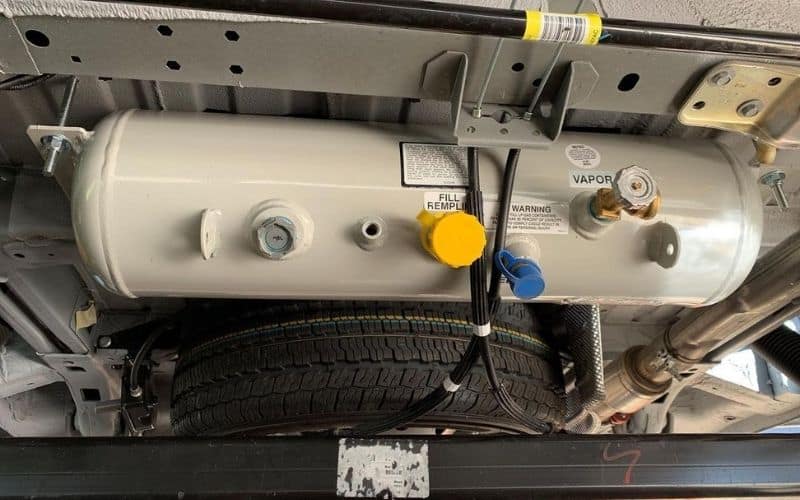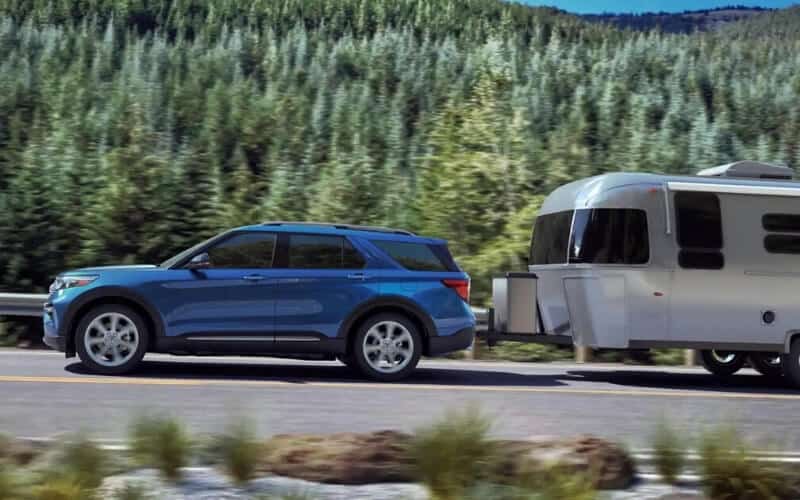Running out of propane in your RV means no stovetop cooking, no central heat, no hot water, and an inability to keep your fridge running if you aren’t plugged into shore power. In other words, it makes RV camping a whole lot less fun.
So new and long-time RVers alike need to know: how long does propane last in an RV?
To answer this question, we have to rely on averages. The average RV furnace, for example, will burn roughly one gallon of propane every three hours.
But that is just your furnace. It doesn’t account for any cooking or hot water demands during that time, which will increase propane consumption.
Additionally, factors like the size of your propane tanks, the BTU ratings for your RV appliances, and how many times you shower per day will impact how long your RV propane lasts.
So you can see how this issue can become complicated quickly. Luckily for you, we’re here to simplify it!
What Are the Typical RV Propane Tank Sizes?
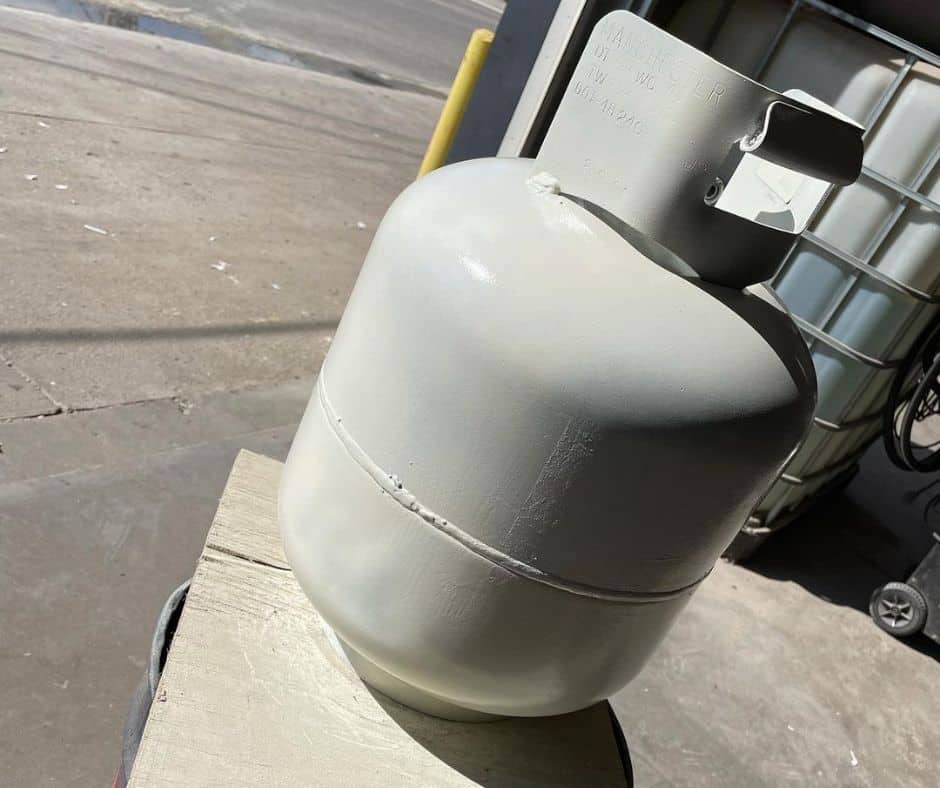
The most common RV propane tank sizes are 20 and 30 pounds. There are also 11 and 40-pound propane tanks that are common on smaller RVs.
It is also important to know that these classifications don’t accurately reflect the amount of propane that these tanks actually hold. T
hat is because propane is typically measured in gallons instead of pounds.
Furthermore, a “full” propane tank is also only filled to 80% of its capacity to allow room for liquid propane to expand without damaging the tank.
So, here is roughly how much propane these common tank sizes actually hold:
Furthermore, many luxury class A RVs and long fifth-wheel trailers have much larger tanks on board.
In some cases, these types of RVs can hold 100-pound, 250-pounds, or even 500-pounds propane tanks.
This is approximately how much these larger propane tanks typically hold:
What Are the Types of RV Propane Tanks?
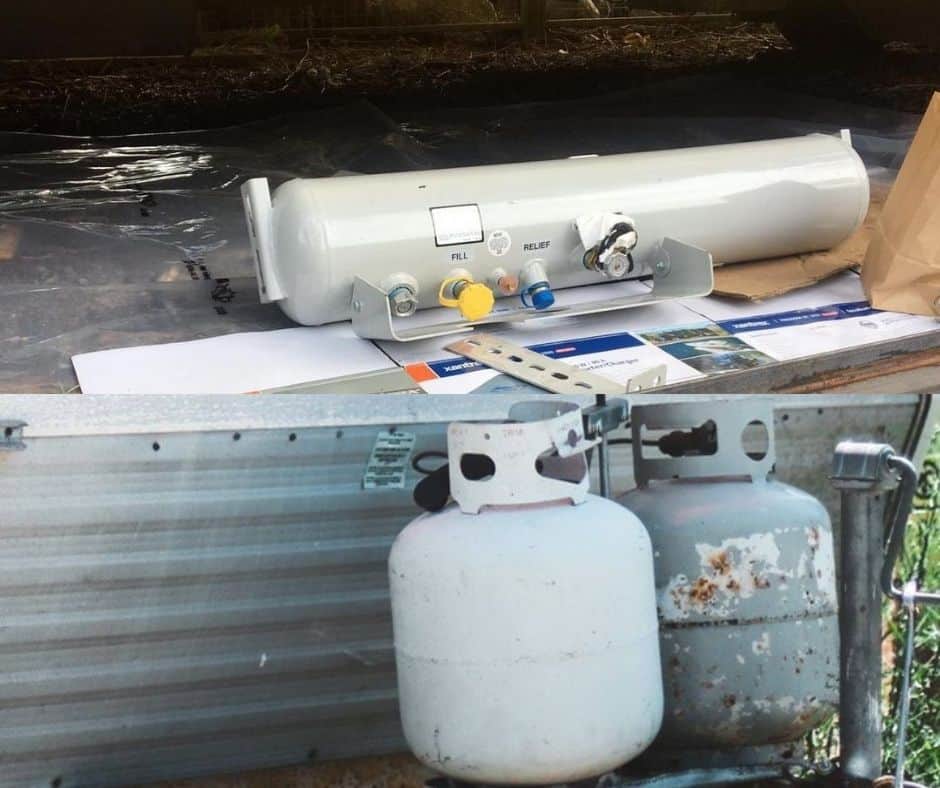
Most typical RV propane tanks are either certified by the Department of Transportation (DOT) or the American Society of Mechanical Engineers (ASME).
DOT propane cylinders are more commonly found on teardrop trailers, fifth wheels, travel trailers, truck campers, and some class B or small class C motorhomes.
They are removable and replaceable like the propane tank used on most residential grills.
You will usually find DOT cylinders mounted on the tongue of the trailer or on the rear bumper of small campers.
In some cases, they are mounted to the outside of the trailer but hidden by an external compartment door.
ASME propane tanks are more common for larger Class A and Class C motor coaches.
They are typically built right into the frame of the camper so they cannot be removed and refilled.
That means you need to pull your RV up next to a propane refill station to top your tank off.
How Long Does Propane Last in an RV?
The lifespan of RV propane tanks is highly variable. It depends on three critical factors:
Before we provide a basic propane usage calculator below, we need to discuss BTUs and how they impact how long your RV propane will last.
How Do BTUs Impact Propane Consumption?
BTU stands for ‘British Thermal Units’. It is a measurement of the amount of energy required to heat a pound of water by a single degree (Fahrenheit) at sea level.
Luckily, we don’t need to dive too deeply into the science of BTUs to understand how they impact your RV’s propane levels.
If you are burning propane at a rate of 1000s BTUs per hour, it will take about 95 hours for you to burn through one gallon of propane. But most RVs burn propane at a much higher rate.
Where things get a little more complex is when you realize that each of the appliances inside your RV that utilize propane come with a BTU rating.
These ratings will help you determine how many gallons of propane your appliances consume per hour.
Let’s look at some common propane RV appliances and their average BTU ratings:
-
RV furnaces average 1,000 BTUs per linear foot of RV length
-
A 30-foot RV would typically boast a 30,000-BTU furnace
-
-
RV water heaters average between 30,000 and 50,000 BTUs
-
RV refrigerators average 1,500 BTUs (when running on propane)
-
Large burners on RV stovetops average 9,000 BTUs
-
Smaller adjacent stovetop burners average 6,500 BTUs
Knowing the BTU ratings of your appliances is important, but how about the BTU capacity of a propane tank. Here are a few more numbers that you will need for future calculations:
-
One gallon of propane offers a capacity of 91,502 BTUs
-
One pound of propane offers a capacity of 21,548 BTUs
With these averages and tank BTU capacities in mind, let’s move on to examine how you can calculate your specific propane usage.
RV Propane Usage Calculator
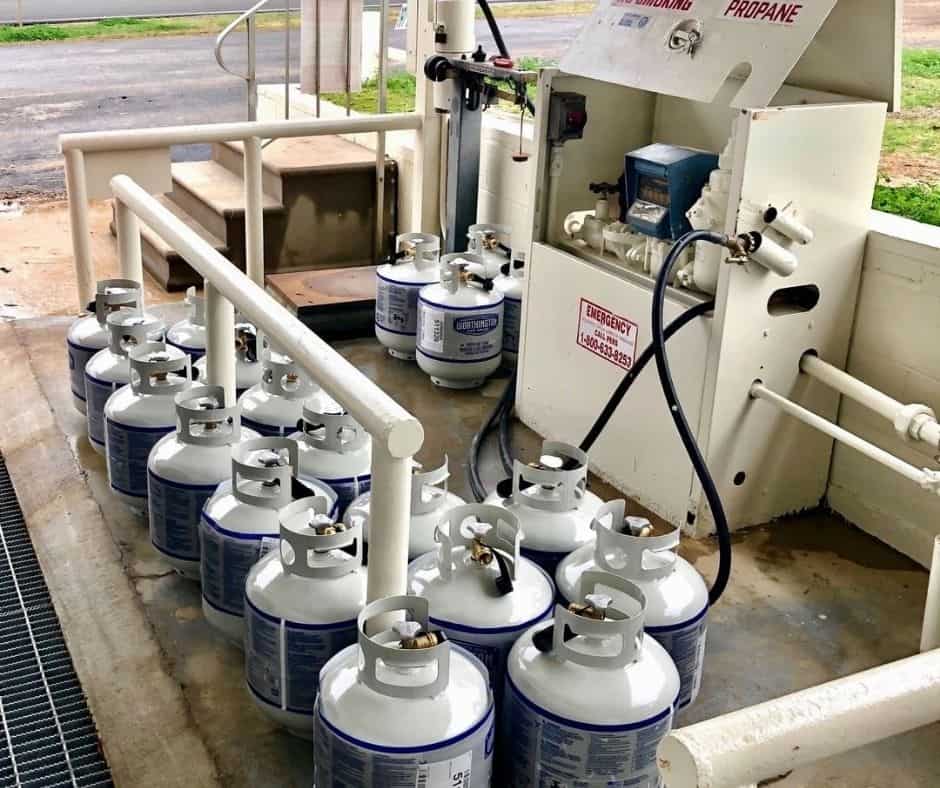
Let’s look at some basic calculations to help you determine how long your RV propane will last.
Step 1: Determine The Size of Your RV Propane Tanks
Start by consulting your RV owner’s manual to decide the size and propane capacity of your RV’s propane tanks.
If you happen to have an older RV and haven’t kept track of your manual, you may be able to find this information online or by calling the manufacturer directly.
While some claim that you can use either pounds or gallons to note the size of your RV propane tanks, we recommend using gallons because it is a more accurate measurement of the true capacity of your tanks.
Step 2: Calculate the BTU Capacity of Your Tanks
Here’s where you will need to do a little math. Now that you have noted how many gallons of propane can be stored in your tanks, you can use 91,502 to calculate your total BTU capacity.
Here’s a quick example:
Step 3: Determine How Long You Can Run Your Appliance
Based on the total BTU capacity that you come up with for your RV, you will now be able to compare that to the BTU ratings for the individual propane appliances in your rig.
Here’s a quick example based on our RV with the 841,818.4 BTU capacity and the average appliance BTU Ratings we mentioned above:
Now, if we add up the total BTUs for all of the appliances listed above, we can approximate how long your propane would last if you were running all appliances consistently and simultaneously:
Remember that most of the time you will be using more than one of these appliances at a time.
You will also utilize your stovetop for much shorter periods than your refrigerator (which will be consuming propane consistently unless relying on AC or DC power).
So the best strategy for monitoring your RV propane levels is to check your digital indicator light or manual gauge often.
When you get down to about one-quarter of a tank remaining, it is time to refill.
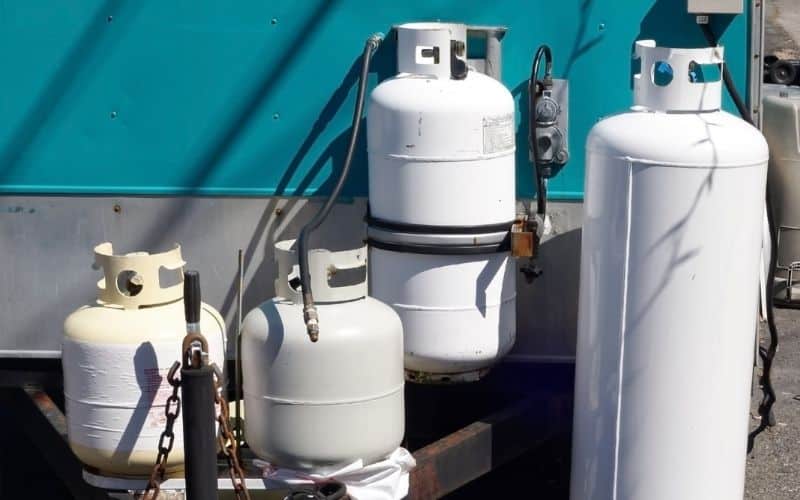
How Long Does a 20 LB Propane Tank Last in an RV?
If you are only running your 30,000-BTU furnace, a 20-pound propane tank will last roughly 13.5 hours.
That will barely get you through a cold winter night if you only have about 4.6 gallons of propane on board.
A 20-pound tank that is filled with 4.6 gallons of propane equates to roughly a 420,909.2 total BTU capacity.
The BTU ratings for your RV’s propane appliances and your usage rate will ultimately dictate how long this 4.6 gallons of propane will last in your RV.
How Long Does a 30 LB Propane Tank Last in an RV?
An RV with a 30-pound propane tank will be able to run a 30,000-BTU furnace for about 21 hours.
That seven gallons of propane can disappear much more quickly if you are running multiple propane appliances simultaneously.
Your 30-pound propane tank (filled with 7 gallons of propane) will offer a capacity of 640,514 BTUs.
Use that upper limit to calculate how long your propane will last based on your RV’s appliance ratings and usage rate.
How Long Does a 40 LB Propane Tank Last in an RV?
If your camping trailer is equipped with a 40-pound propane tank, you will be able to run a 30,000-BTU furnace for approximately 28.2 hours before running out of propane.
You should be able to heat your RV consistently for more than a full day with those 9.4 gallons of propane.
The total BTU capacity for a 40-pound tank filled with 9.4 gallons of propane is approximately 860,118.8 BTUs.
You can divide that total capacity by the individual or collective BTU ratings for your specific RV’s appliances to determine how long your 40-pound propane tank will last.
How Long Do Larger Propane Tanks Last in an RV?
The larger propane tanks in bigger rigs are obviously better for boondocking or longer dry camping trips.
Based still on our examples of only burning propane by running a 30,000-BTU furnace, this is how long you might expect your propane to last in those larger tanks:
While that could be useful for some of you, here are the BTU capacities for these larger tanks to help you more accurately calculate your propane usage:
Please keep in mind that these averages can change dramatically if you are running propane appliances more or less than the average RV.
Use the tips above to make more accurate calculations and, remember, the more you are mindful about your propane use, the longer your propane will last.
How Does Air Temperature Affect Propane BTU Capacity?
You will burn through propane much faster when it is cold outside. Extremely cold temperatures (below zero degrees) can decrease the BTU capacity of propane by more than 50 percent.
How Do I Know if My RV Propane Tank is Empty?
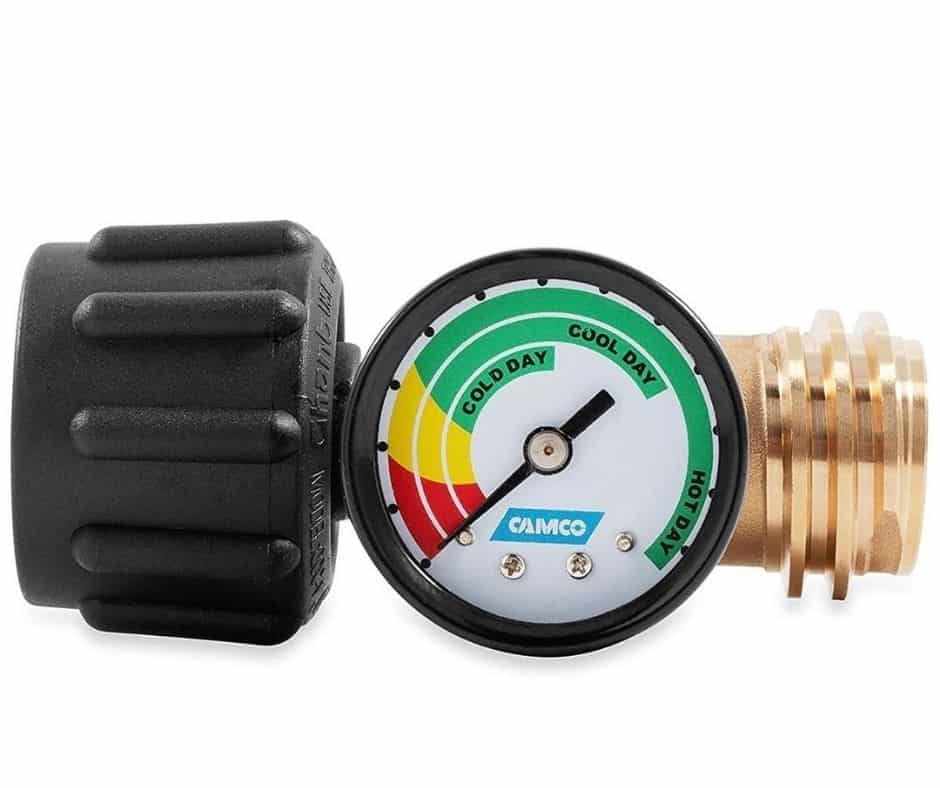
Well, you will definitely know if you attempt to light up your propane stovetop or start your heater and are disappointed with the results.
Aside from it being obvious when your propane appliances aren’t working, you can also monitor your propane levels while staying in your RV.
Most modern RVs and travel trailers are equipped with some type of digital propane monitoring system.
These systems include an indicator of how much propane is remaining in your tank.
That indicator is usually found on the dashboard in the cockpit or mounted somewhere above your RV door.
In addition to that, many larger RVs have a gauge on the outlet of the propane tank.
So if your digital indicator isn’t working for some reason (which happens a lot on older RVs), you can check the external gauge.
With smaller RVs and travel trailers that are equipped with DOT cylinders, however, you may not have a digital or a manual gauge to help you monitor propane levels.
Fortunately, you can grab an aftermarket propane gauge and install it on your tank to help you know when your propane tank is approaching empty.
Tips To Make RV Propane Last Longer
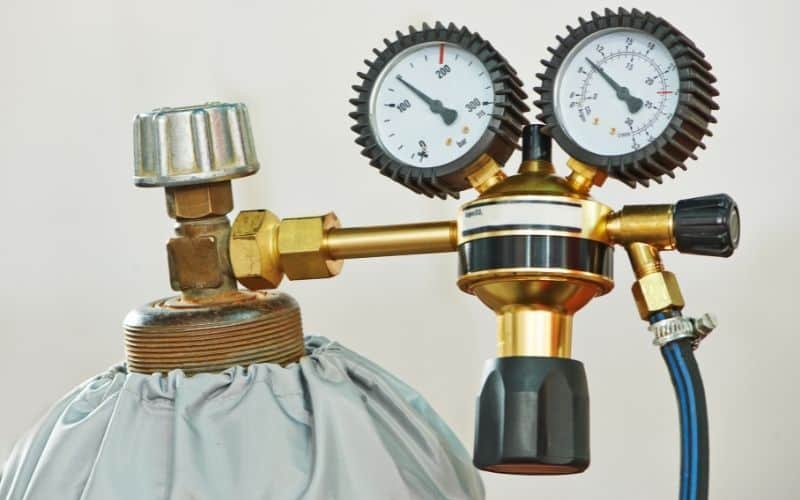
The good news for many RVers is that a lot of campgrounds offer propane refill stations.
For those of you that are interested in boondocking or dry camping, however, knowing how long your propane stores will last can dictate how long you can stay at remote destinations.
So here are a few tips to help you make your RV propane last a bit longer:
Rely More on Electricity
One tried-and-true method for making RV propane last longer is to rely more on electricity.
That means seeking out campgrounds with full hookups so that your fridge can run on AC while you are camping.
In addition, you can consider running electric space heaters instead of relying solely on your RV furnace.
This solution is best for short-term RV trips, but many campgrounds will charge for electricity based on monthly usage if you are staying long-term, which can sometimes wind up being more expensive than propane.
Harness the Power of the Sun
Depending on where you are camping, you may be able to rely on the power of the sun to trap heat inside your RV.
This is best for locations that have large temperature swings and get fairly chilly at night.
Open your RV blinds and windows up during the day to allow the natural heat from the sun to pour into your RV.
Then close everything up in the late afternoon to trap that heat inside so that you can make your propane last longer by avoiding running your furnace all night.
Cook Outside
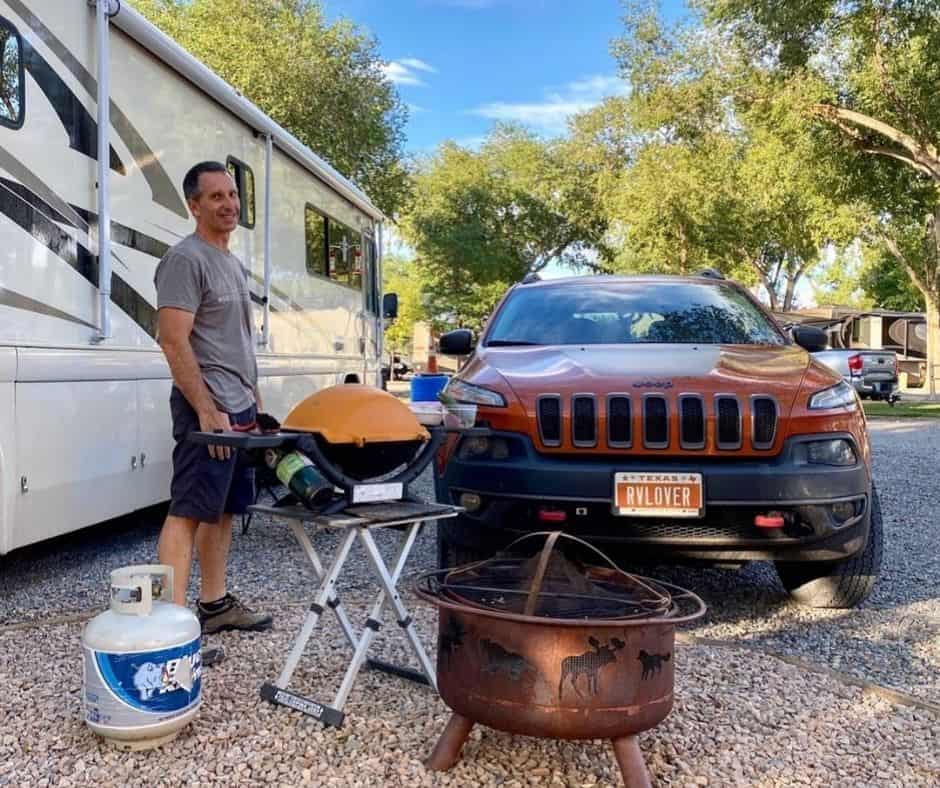
While many camping stoves also run on propane, stocking up on small one-pound green propane bottles is often easier than moving a larger RV to refill the built-in propane tank.
And you won’t need to worry about propane at all if you cook over a campfire.
Cooking outside will allow you to save propane for heating your RV and making sure you have hot water for showers.
It also allows you to avoid overheating the inside of your RV when camping in especially warm climates.
Take ‘RV Showers’
Showering in an RV is way different than showering at home. Not only do you need to think about conserving water, but you also need to consider how much propane you are using to heat that water.
Taking an ‘RV shower’ will help with both of these issues. There’s no big secret or special formula to it.
Here’s our preferred formula:
The vast majority of the water we waste while showering happens during the times when we step out of the flow to lather with soap.
By shutting the water off when you really don’t need it, you can conserve water and make your RV propane last longer.
Add Insulation To Your RV
Adding insulation to your RV will reduce overall heat transfer. This will be helpful in both warm and cool temperatures because it will work to keep your RV cool in the summer when you are running your air conditioner and warm in the winter when relying on your furnace.
When you are dealing with colder temperatures, adding RV insulation will reduce the strain on your furnace.
By slowing down heat transfer and allowing your furnace to run less, you will be able to make your propane last longer.
The easiest way to add insulation to your RV is to invest in roof vent covers and reflective foil.
Vent covers will reduce heat loss through your roof vents and you can add reflective foil to some or all of your RV windows to prevent further heat loss through those thinner panes of glass.
Invest in a Heated Blanket or Comforter

Cold nights are typically when most RVers burn through propane the fastest. But you can make your propane last longer by turning your thermostat down slightly just before you crawl into bed.
After all, there is little need for the living room and kitchen areas of your RV to be nice and toasty while you are exploring the dream world.
If you invest in a heated electric blanket, you will be able to stay nice and cozy in bed while also reducing your nightly propane consumption.
The only downside to this strategy is chilly mornings. So it helps to prep things like your coffee maker or tea kettle the night before.
That way, you can wake up, turn up the thermostat and start your preferred hot morning beverage, and then crawl back under your heated blanket until things warm up a bit!
Conclusion
If you have a relatively new RV or travel trailer, the digital monitoring systems onboard take a lot of the stress out of having to know how long propane lasts in an RV.
But if you have an older rig, you will need to be more diligent.
Hopefully, the tips and insights we have provided above will help you conserve propane when needed and calculate just how long you can go once you fill the tank (or tanks) in your rig.
Until next time, we wish you the safety and most adventurous RV trips in the months to come!

